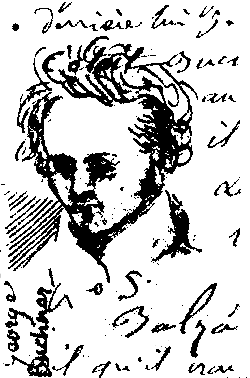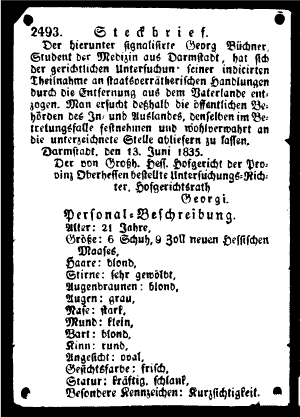|
Loading
|
|
|

"Peace to the hovels! Death to the palaces!" (Büchner)
Hugh Rank writes on Georg Büchner and Danton's Death
| "The relationship between the poor and the rich is the only revolutionary element in the world" |
Karl Georg Büchner was born at Goddelau, a village near Darmstadt in the Grand Duchy of Hesse, on 17 October 1813, into a medical family of long tradition, the oldest of six children, one of whom — Ludwig — became the world famous author of the materialistic Kraft und Stoff (Strength and Matter). When Georg was three years old the family moved to Darmstadt where he spent a happy childhood, influenced by the energy and scientific precision of his father and by his mother's love of poetry, fairy tales and Volkslieder. He was an undistinguished pupil, the natural sciences being his main interest. At the age of 14 to 15 he wrote some imitative poetry, but nothing to suggest his later genius. The educational system stifled him: "Oh for something alive! What's the good of this deadwood!" he wrote in one of his schoolbooks. His burgeoning preoccupation with the ideal of freedom broke through in an essay in 1830, the year of the July revolution, where the 16-year-old referred to the French Revolution as the "just war of extirpation revenging the abominations which infamous despots have inflicted on suffering mankind for centuries".
| "Reform society by ideas? Impossible! Our epoch is altogether materialistic ... You will never bridge the gap between the educated and the uneducated. " |
| "There are people here who predict a splendid future for me. I have no objection." |
Six months after leaving school he began his medical studies at Strassburg, then a French city, where he made many friends and led a very active social life. He fell in love with Wilhelmine (Minna) Jaegle, daughter of his clergyman-landlord. During his two happy years in Strassburg (1831 to 33) he became secretly engaged to Minna who remained the only woman in his life and, after his premature death, stayed single.
| "I shall always act according to my principles but I have convinced myself of late that only the compelling need of the masses can result in change; that all agitation and noise of individuals remains fruitless and foolish. You can count on it that I shall take no part in the Giessen backstreet politics and their revolutionary childish pranks." |
In April 1833 an abortive coup took place in Frankfurt on Maine with which Büchner was in entire sympathy, being convinced that only force could advance the progressive cause. The spark that had been ignited in Frankfurt was nurtured in Giessen, the small university town where Büchner was obliged to complete his studies in order to qualify as a doctor. He tried to assuage the anxieties of his father, a staunch monarchist, who feared Georg would become involved in revolutionary activities in Giessen; a fear that proved only too justified in spite of Georg's soothing words. After the freedom and colour of Strassburg, Büchner felt very hamstrung and frustrated at Giessen. To shut out the prevailing social and political conditions he "read medicine by day and history and philosophy by night". Due to illness, probably of a psychosomatic nature, he went home to Darmstadt in November 1833 from where he wrote to a friend: "The political state of affairs drives me mad. The poor people patiently pull the cart on top of which the princes and the educated act out their bizarre comedy."
| "If the revolution should ever come to pass it could and must only happen through the great mass of the people. Their numerical superiority and weight would have to overpower the military:' |
Büchner suffered greatly. Prevailing conditions among the peasantry were shocking indeed. Absolutism was still in full swing, in spite of promises of constitutional reform made earlier. Hunger was rife. The peasants received less and less for their corn while taxation was steadily rising. Local rebellions were brutally put down by the military: "With their drums the soldiers drown the sound of your sighs, with their rifle butts they smash your skulls. ..They are the lawful murderers who protect the lawful robbers" (Büchner). Emigration depended on the permission of the Grand Duke. Luckily for many, Hesse was surrounded by no less than ten separate German yet "foreign" states so that escape was not too difficult.
| "A dramatic poet is, in my view, no more than a writer of history, but he stands above the latter by creating history for the second time and, instead of giving us dry narrative, transfers us into the life of the epoch; gives us characters instead of characteristics and real people instead of descriptions. .. If, incidentally, somebody tells me the poet is not to present the world as it is but as it should be, I reply that I do not intend to do things better than God. ..I cannot turn Danton and the bandits of the revolution into paragons of virtue! When I wanted to depict their slovenliness I had to make them slovenly; when I wanted to show their godlessness I had to make them talk like atheists. ..The poet is no teacher of morality, he invents and creates characters, he revives past times. Let people learn from it just as they may learn through the study of history and from observation of daily life." |
On his early return to Giessen Büchner was introduced to Ludwig Weidig, an active progressive, but also a devout Christian, a concept for which the atheistic Büchner had no sympathy. However, a secret printing press which Weidig owned proved an irresistible attraction for Büchner in his passionate attempt to bring about a revolution "from below" which he thought could be best advanced by pamphleteering among the peasantry. In March 1834 he wrote Der Hessische Landbote (The Hesse Country Messenger), a brilliant pamphlet in bold, impassioned but simple language, aimed at the peasantry, which opened with the inflammatory words: "Peace to the hovels! Death to the palaces!" The campaign failed: the peasants were too frightened to hold on to the pamphlets and handed them over to the police, for penalties for subversive activities often led to ruin. Büchner's room was searched in his absence and he narrowly escaped arrest. In addition to the "high treason" of the Messenger; Büchner founded in the same month the Society for Human Rights: in semi-feudal Giessen, a very dangerous conspiratorial enterprise and bound to fail. Deeply disappointed, Büchner returned home, not without having arrived at some realistic evaluation of the peasantry, their "vile mentality" and their exclusive concern for the "money bag."
Back in Darmstadt, he wrote Dantons Death under great pressure in less than five weeks while he was under close police surveillance for his political activities. He wrote it in haste and secrecy, his dissection table serving him as a writing desk, which he quickly covered with medical papers in order to hide the manuscript from his father. On completion in February 1835 he sent it to the well-known litterateur Karl Gutzkow, who immediately recognised Büchner's genius and arranged publication as early as July 1835, although for fear of censorship, in a bowdlerised version. Dantons Death is Büchner's only work that was published in his life time.
| "For the last few days I have taken up my quill every other minute but found it impossible to put down a single word. I have been studying the history of the Revolution. I feel shattered by the ghastly fatalism of history. In human nature I find horrible uniformity, in social life an inescapable force which is given to everybody and nobody. The individual is but froth on the crest of a wave, greatness but an incident, the dominance of genius but a puppet-show, an absurd wrestling match against an iron rule which we can, at best, perceive but which we cannot possibly master. I would not dream of bowing and scraping before the plumed horses or lackeys of history. I train my eyes to get used to the sight of blood, but I am no blade of the guillotine. Man has been baptised with words of damnation of which 'must' is one. The saying 'Woe unto the world because of offences! For it must needs be that offences come; but woe to that man by whom the offence cometh' [Mathew 18:7] is horrifying. What is this power within us which lies, murders, cheats? I don't want to follow up the thought but I wish I could lay my cold and tortured heart upon your bosom!" |
Whilst writing it, he had repeatedly to appear as a "witness" before the police, a sign of mounting political danger. Rather than face auest, he fled to Strassburg (9 March 1835). On 13 June the Darmstadt police issued a warrant for his arrest and from then on he was in constant danger of being forced back to Germany. He lived on the proceeds from the translation of two plays by Victor Hugo and some financial support from his father, who was deeply worried at the direction which his son had taken. In the autumn of 1835 Büchner wrote his (fragmentary) novel Lenz and in the winter the scientist came to the fore again: he investigated the nervous system offish, on which subject he delivered a series of three lectures at the Association of Natural Sciences in Strassburg. For these he was awarded a Doctorate of Philosophy by the University of Zurich where he moved in October 1836 to take up an appointment as a Privatdozent (unestablished University lecturer). In November he lectured On the Nerves of the Cranium.
In the spring of 1836 he had written his fairy-tale play Leonce and Lena, to be followed in the winter months by the composition of Woyzeck (which remained unfinished and upon which Alban Berg based his opera Wozzeck).
On 27 January 1837 he wrote a happy letter to Minna:
"I don't feel like dying and am in as good health as ever. .. Addio, piccola mia!" It turned out to be his last letter to her. On 2 February he fell ill and ran a temperature. It took the doctors almost two weeks to diagnose typhoid. Minna hurried from Strassburg to his sickbed. According to a friend who looked after him, Büchner the atheist declared: "We do not suffer too much pain, we suffer too little; for through pain we join God. We are death, dust, ashes. How can we complain?"
He died the following day, 19 February 1837, aged 23 years and four months: youngest of immortals.
Wanted
 German Newspaper Annoucement:
German Newspaper Annoucement:
The hereinafter named GEORG BÜCHNER, a medical student from Darmstadt, has absented himself from the Judicial Enquiry into his alleged participation in treasonable activities by leaving the Fatherland.
The authorities, both at home and abroad, are hereby requested to arrest this man on sight and to deliver him safely to the office below.
Darmstadt 13 June 1835.
High Court Judge of the Archduchy of Hesse, appointed Judge of the Upper Hesse Court of Enquiry.
Georgi
Description:
- Age:
- 21
- Height:
- 6 shoes 9 thumbs (new Hessian measure)
- Hair:
- Fair
- Forehead:
- Prominent and rounded
- Eyebrows:
- Fair
- Eyes:
- Grey
- Nose:
- Large
- Mouth:
- Small
- Beard:
- Fair
- Chin:
- Rounded
- Face:
- Oval
- Colouring:
- Fresh
- Figure:
- Powerful, slender
- Special Peculiarities:
- Shortsighted